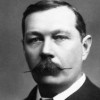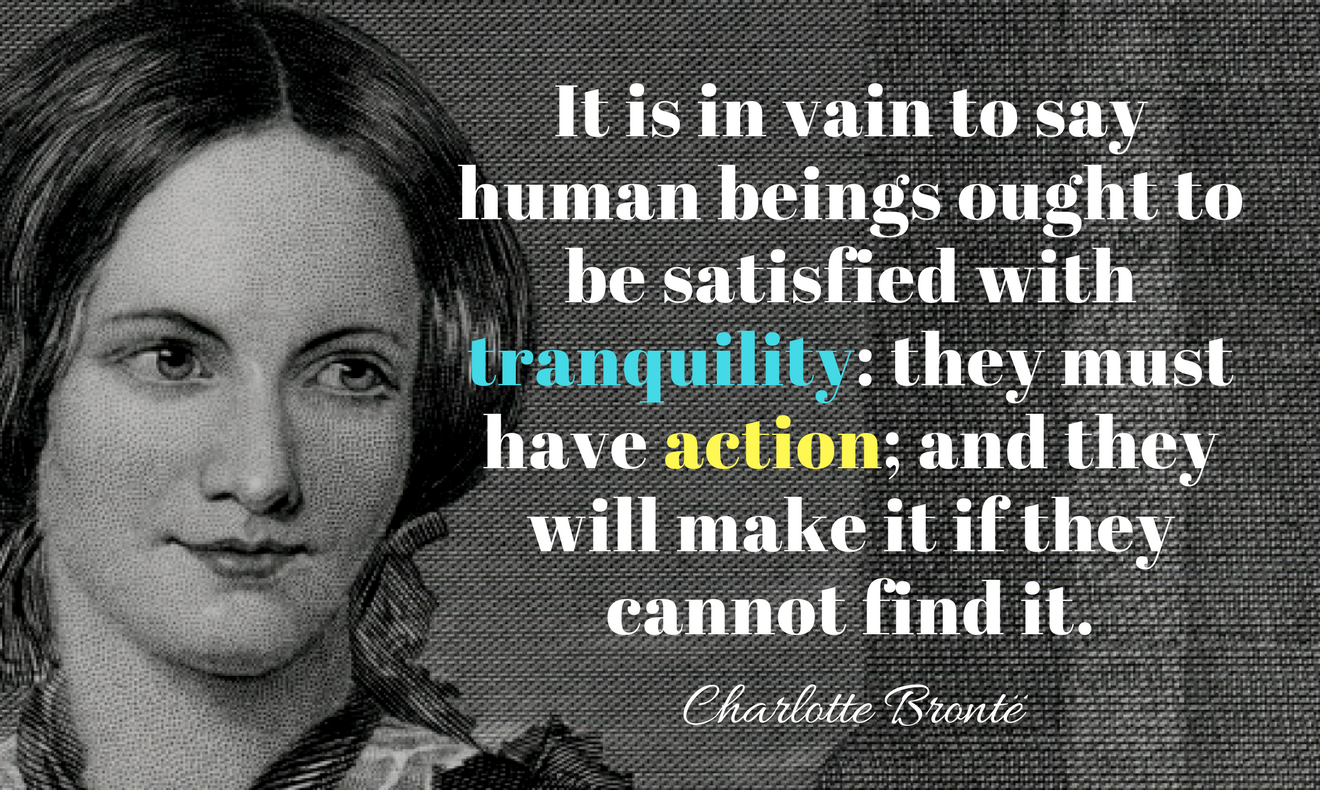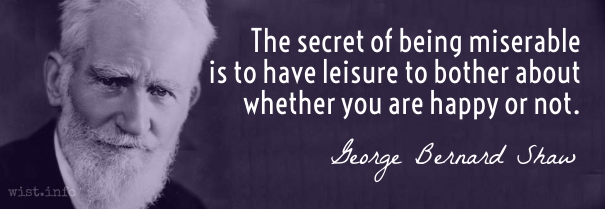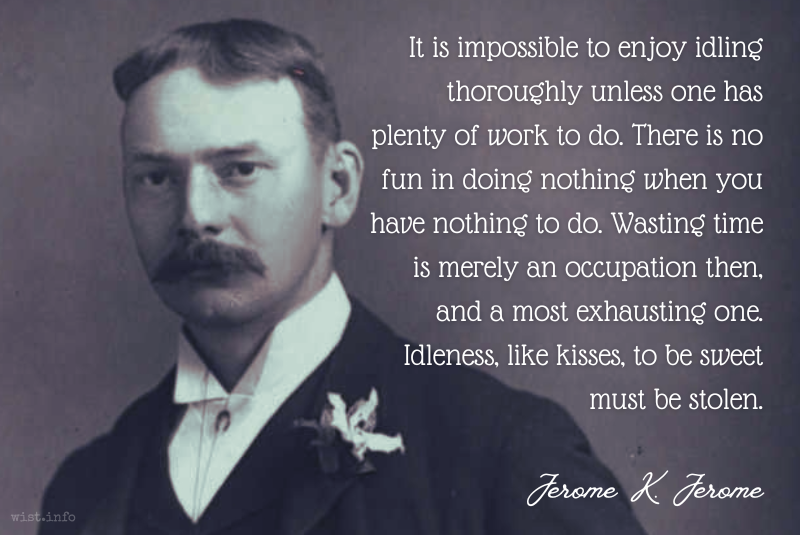I have seen descriptions of Paradise sufficient to make all sensible people give up their hopes of it: some make the happy shades play incessantly on the flute; others condemn them to the torture of an everlasting promenade; while others, who represent them as dreaming on high of their mistresses below, are of opinion that a period of a hundred millions years is not sufficient to overcome a taste for the pains of love.
[J’ai vu des descriptions du paradis, capables d’y faire renoncer tous les gens de bon sens: les uns font jouer sans cesse de la flûte ces ombres heureuses; d’autres les condamnent au supplice de se promener éternellement; d’autres enfin, qui les font rêver là-haut aux maîtresses d’ici-bas, n’ont pas cru que cent millions d’années fussent un terme assez long pour leur ôter le goût de ces inquiétudes amoureuses.]
Charles-Lewis de Secondat, Baron de Montesquieu (1689-1755) French political philosopher
Persian Letters [Lettres Persanes], Letter 126, Rica to *** (1721) [tr. Davidson (1891)]
(Source)
(Source (French)). Alternate translations:
I have seen descriptions of paradise capable of disgusting all men of right understanding: some represent the happy shades incessantly playing on the flute: others condemn them to the punishment of eternally walking about: others again will have those above to be always musing on their mistresses here below, not thinking a hundred millions of years term long enough to make them lose the relish of these amorous inquietudes.
[tr. Ozell (1760 ed.), # 123]
I have read descriptions of Paradise, capable of disgusting every sensible person. The happy shades, according to the fancy of some, are continually playing on the flute, others condemn them to the punishment of eternally walking about; others in short make those above to be always raving after their mistresses here below, not thinking a hundred millions of years long enough to make them get quit of their amorous inquietudes.
[tr. Floyd (1762), # 125]
I have read descriptions of Paradise that would lead all sensible people to renounce it at once: some persons would have the happy shades play eternally on the flute; others condemn them to the torture of a never ending promenade; others who make them dream in heaven of their mistresses on earth, have expressed their belief that even a hundred millions of years would not be long enough to take from them the zest for amatory excitements.
[tr. Betts (1897), # 125]
I have seen descriptions of paradise that would have made any sensible person reject it. Some would have the joyous shades play incessantly upon the flute; others would condemn them to the torture of an eternal promenade; others, who would have them dream on high of their mistresses down below, have assumed that even in a hundred million years they will not lose their taste for such uneasy affairs.
[tr. Healy (1964), # 125]
I have seen descriptions of paradise that would make any man of sense avid going there. Some say the happy spirits in the afterlife engage in an endless bout of flute playing; others that it is an interminable walking about. Others depict them as endlessly dreaming about their mistresses down here, apparently thinking that a hundred million years is too short a time for us to lose our taste for these amorous adventures.
[tr. MacKenzie (2014)]
Quotations about:
boredom
Note not all quotations have been tagged, so Search may find additional quotes on this topic.
It is bad when a married pair bore each other, but far worse when only one of them bores the other.
[Es ist schlimm, wenn zwei Eheleute einander langweilen, viel schlimmer jedoch ist es, wenn nur Einer von ihnen den Andern langweilt.]
Marie von Ebner-Eschenbach (1830-1916) Austrian writer
Aphorisms [Aphorismen], No. 283 (1880) [tr. Wister (1883)]
(Source)
(Source (German)). Alternate translation:
It's bad enough when married people bore one another; but it's far worse when only one of them bores the other.
[tr. Scrase/Mieder (1994)]
Where other powers of entertainment are wanting, the true philosopher will derive benefit from such as are given.
One must work, if not out of inclination, at least out of despair. All things considered, work is far less boring than entertaining oneself.
[Il faut travailler, sinon par goût, au moins par désespoir, puisque, tout bien vérifié, travailler est moins ennuyeux que s’amuser.]Charles Baudelaire (1821-1867) French poet, essayist, art critic
Journaux Intimes [Intimate Journals], “Mon cœur mis à nu [My Heart Laid Bare],” § 40 (1864–1867; pub. 1887) [tr. Sieburth (2022)]
(Source)
(Source (French)). Alternate translations:
One must work, if not from inclination at least from despair, since, as I have fully proved, to work is less wearisome than to amuse oneself.
[tr. Isherwood (1930)]
It is necessary to work, if not from inclination, at least from despair. As it turns out, work is less boring than amusing oneself.
[Source, e.g.]
One must work, if not from inclination, at least out of despair -- since it proves, on close examination, that work is less boring than amusing oneself.
[Source, e.g.]
Traditionally, a luncheon is a lunch that takes an eon.
Judith Martin (b. 1938) American author, journalist, etiquette expert [a.k.a. Miss Manners]
“Miss Manners,” syndicated column (1982-04-18)
(Source)
Reprinted in Miss Manners' Guide for the Turn-of-the-Millennium, Part 6 "Genuine Social Life," "Social Occasions" (1989). Often incorrectly attributed to Miss Manners' Guide to Excruciatingly Correct Behavior (1983).
Those whom the Gods wish to destroy, they first make bored.
Ian Fleming (1908-1964) British writer, journalist, intelligence officer
From Russia with Love, Part 2, ch. 11 (1957)
(Source)
A "curious bastard quotation" (variant of a phrase attributed to Euripides) that crosses Bond's mind when wondering if ennui is driving him to tank his own career.
FIRST SERVINGMAN: Let me have war, say I. It exceeds peace as far as day does night. It’s sprightly walking, audible, and full of vent. Peace is a very apoplexy, lethargy; mulled, deaf, sleepy, insensible; a getter of more bastard children than war’s a destroyer of men.
William Shakespeare (1564-1616) English dramatist and poet
Coriolanus, Act 4, sc. 5, l. 244ff (4.5.244-249) (c. 1608)
(Source)
People sometimes tell me that they prefer barbarism to civilisation. I doubt if they have given it a long enough trial. Like the people of Alexandria, they are bored by civilisation; but all the evidence suggests that the boredom of barbarism is infinitely greater. Quite apart from the discomforts and privations, there was no escape from it.
Kenneth Clark (1903-1983) British art historian, museum director, broadcaster
Civilisation, A Personal View, ch. 1 “The Skin of Our Teeth” (1969)
(Source)
Now, as in the Latin and other languages, a yawning fellow is synonymous or equivalent to a negligent and sluggish fellow; this idle custom ought certainly to be avoided; being (as was observed) disagreeable to the sight, offensive to the ear, and contrary also to that natural claim, which every one has, to respect. For when we indulge ourselves in this listless behaviour, we not only intimate that the company we are in does not greatly please us; but also make a discovery, not very advantageous to ourselves; I mean, that we are of a drowsy, lethargic disposition: which must render us by no means amiable or pleasing to those with whom we converse.
[Et ho io sentito molte volte dire a’ savi litterati che tanto viene a dire in latino «sbadigliante» quanto ’neghittoso’ e ’trascurato’. Vuolsi adunque fuggire questo costume, spiacevole -come io ho detto- agli occhi et all’udire et allo appetito; perciò che, usandolo, non solo facciamo segno che la compagnia con la qual dimoriamo ci sia poco a grado, ma diamo ancora alcun indicio cattivo di noi medesimi, cioè di avere addormentato animo e sonnacchioso; la qual cosa ci rende poco amabili a coloro co’ quali usiamo.]
Giovanni della Casa (1503-1556) Florentine poet, author, diplomat, bishop
Galateo: Or, A Treatise on Politeness and Delicacy of Manners [Il Galateo overo de’ costumi], ch. 3 (1558) [tr. Graves (1774)]
(Source)
(Source (Italian)). Alternate translations:
A yawner meaneth as much in Latin as a careles and Idle bodie. Let us then flye these condicions, that loathe (as I said) the eyes, the Eares, & the Stomacke. For in using these fashions, we doe not only shewe that we take litle pleasure in the company, but we geve them occasion withall, to judge amis of us : I meane yt we have a drowsye & hevie nowle, which makes us ill wellcom, to all companies we come unto.
[tr. Peterson (1576)]
Many times have I heard learned men say that in Latin the word for yawning is the same as that for lazy and careless. It is therefore advisable to avoid this habit which, as I have said, is unpleasant to the ear, the eyes, and the appetite, because by indulging in it we show that we are not pleased with our companions, and we also give a bad impression of ourselves, that is to say, that we have a drowsy and sleepy spirit which makes us little liked by those with whom we are dealing.
[tr. Einsenbichler/Bartlett (1986)]
If you wind up with a boring, miserable life because you listened to your mother, your Dad, your priest, to some guy on television, to any of the people telling you how to do your shit, then you deserve it.
Frank Zappa (1940-1993) American singer-songwriter
The Real Frank Zappa Book, ch. 13 “All About Schmucks” (1989) [with Peter Occhiogrosso]
(Source)
Frequently quoted with variations (perhaps from other occasions when Zappa said it), e.g.,:
If you end up with a boring, miserable life because you listened to your mom, your dad, your teacher, your priest, or some guy on television telling you how to do your shit, then you deserve it.
There is always something pleasurable in the struggle and the victory. And if a man has no opportunity to excite himself, he will do what he can to create one, and according to his individual bent, he will hunt or play Cup and Ball: or led on by this unsuspected element in his nature, he will pick a quarrel with someone, or hatch a plot or intrigue, or take to swindling and rascally courses generally — all to put an end to a state of repose which is intolerable.
[Der Kampf mit ihnen und der Sieg beglückt. Fehlt ihm die Gelegenheit dazu, so macht er sie sich, wie er kann: je nachdem seine Individualität es mit sich bringt, wird er jagen, oder Bilboquet spielen, oder, vom unbewußten Zuge seiner Natur geleitet, Händel suchen, oder Intriguen anspinnen, oder sich auf Betrügereien und allerlei Schlechtigkeiten einlassen, um nur dem ihm unerträglichen Zustande der Ruhe ein Ende zu machen.]
Arthur Schopenhauer (1788-1860) German philosopher
Parerga and Paralipomena, Vol. 1, “Aphorisms on the Wisdom of Life [Aphorismen zur Lebensweisheit],” ch. 5 “Counsels and Maxims [Paränesen und Maximen],” § 2.17 (1851) [tr. Saunders (1890)]
(Source)
(Source (German)). Alternate translation:
The struggle with [obstacles] and the triumph make him happy. If he lacks the opportunity for this, he creates it as best he can; according to the nature of his individuality, he will hunt or play cup and ball; or, guided by the unconscious urge of his nature, he will pick a quarrel, hatch a plot, or be involved in fraud and all kinds of wickedness, merely in order to put an end to an intolerable state of repose.
[tr. Payne (1974)]
JUBA: Beauty soon grows familiar to the lover,
Fades in his eye, and palls upon the sense.
Tiny Monster Island is one of the more boring Mechanicsburg landmarks. Unless, of course, one is foolish — or unfortunate — enough to leave the path. Then it becomes very exciting indeed.
Phil Foglio (b. 1956) American writer, cartoonist
Agatha H and the Voice of the Castle (2014)
(Source)
Make sure you have finished speaking before your audience has finished listening.
Dorothy Sarnoff (1914-2008) American opera singer, actress, image consultant
Speech Can Change Your Life (1970)
(Source)
Blowing a gale all day. Nothing to do and we did it.
Arthur Conan Doyle (1859-1930) British writer and physician
Journal of Arctic voyage (19 Jul 1880)
(Source)
I am convinced that boredom is one of the greatest tortures. If I were to imagine Hell, it would be the place where you were continually bored.
Erich Fromm (1900-1980) American psychoanalyst and social philosopher
“Medicine and the Ethical Problem of Modern Man,” The Dogma of Christ and Other Essays (1931)
(Source)
The formula for prison is a lack of space counterbalanced by a surplus of time. This is what really bothers you, that you can’t win. Prison is lack of alternatives, and the telescopic predictability of the future is what drives you crazy.
Joseph Brodsky (1940-1996) Russian-American poet, essayist, Nobel laureate, US Poet Laureate [Iosif Aleksandrovič Brodskij]
“Less Than One,” Less Than One: Selected Essays (1986)
(Source)
We pay for security with boredom, for adventure with bother.
Peter De Vries (1910-1993) American editor, novelist, satirist
Comfort Me With Apples (1956)
(Source)
Boredom therefore can arise from the cessation of habitual functions, even though these may be boring too. It is also the shriek of unused capacities, the doom of serving no great end or design, or contributing to no master force.
The most useful of all social graces is the ability to yawn with your mouth closed.
Lawrence J. Peter (1919-1990) American educator, management theorist
Peter’s Quotations: Ideas for Our Time (1977)
(Source)
Variant: As quoted in The Wall Street Journal (9 Aug 1984): 'At board meetings, "the one unmatched asset is the ability to yawn with your mouth closed," says Robert Mueller in a new book, 'Behind the Boardroom Door.'"
Most of life is so dull that there is nothing to be said about it, and the books and talks that would describe it as interesting are obliged to exaggerate, in the hope of justifying their own existence. Inside its cocoon of work or social obligation, the human spirit slumbers for the most part, registering the distinction between pleasure and pain, but not nearly as alert as we pretend. There are periods in the most thrilling day during which nothing happens, and though we continue to exclaim, “I do enjoy myself,” or, “I am horrified,” we are insincere. “As far as I feel anything, it is enjoyment, horror” — it’s no more than that, really, and a perfectly adjusted organism would be silent.
E. M. Forster (1879-1970) English novelist, essayist, critic, librettist [Edward Morgan Forster]
A Passage to India, ch. 14 (1924)
(Source)
It is in vain to say human beings ought to be satisfied with tranquility: they must have action; and they will make it if they cannot find it.
Charlotte Brontë (1816-1855) British novelist [pseud. Currer Bell]
Jane Eyre, ch. 12 [Jane] (1847)
(Source)
“What’s the play about?”
“Nobody seems to know.”
“What do the actors say it’s about?”
“They don’t know,” Susan said. She was as close to embarrassed as she gets.
“The actors don’t know what it’s about?”
“No.”
“How about the Director?”
“Lou says that a play is not required to be about anything.”
“And it runs how long?”
“Four and a half hours with an intermission.” Susan smiled encouragingly. “It’s very controversial,” she said.
“Excellent,” I said. “Maybe a fight will break out.”
Books are the perfect entertainment: no commercials, no batteries, hours of enjoyment for each dollar spent. What I wonder is why everybody doesn’t carry a book around for those inevitable dead spots in life.
The most general survey shows us that the two foes of human happiness are pain and boredom.
[Der allgemeinste Überblick zeigt uns, als die beiden Feinde des menschlichen Glückes, den Schmerz und die Langeweile.]
Arthur Schopenhauer (1788-1860) German philosopher
Parerga and Paralipomena, Vol. 1, “Aphorisms on the Wisdom of Life [Aphorismen zur Lebensweisheit],” ch. 2 “Of What One Is” [Von dem, was einer ist]” (1851) [tr. Saunders (1890)]
(Source)
(Source (German)). Alternate translation:
The most general survey shows that pain and boredom are the two foes of human happiness.
[tr. Payne (1974)]
Notoriously insensitive to subtle shifts in mood, children will persist in discussing the color of a recently sighted cement-mixer long after one’s interest in the topic has waned.
Fran Lebowitz (b. 1950) American journalist
“Children: Pro or Con,” Metropolitan Life (1978)
(Source)
Men love better books which please them than those which instruct. Since their ennui troubles them more than their ignorance, they prefer being amused to being informed.
Jean-Antoine Dubois (1765-1848) French Catholic missionary in India [Abbe J. A. Dubois]
(Attributed)
(Source)
Earliest found attribution in The New Era (Jan 1873).
One must, in one’s life, make a choice between boredom and suffering.
Germaine de Staël (1766-1817) Swiss-French writer, woman of letters, critic, salonist [Anne Louise Germaine de Staël-Holstein, Madame de Staël, Madame Necker]
Letter to Claude Hochet (Summer 1800)
Quoted in J. Christopher Herold, Mistress to an Age: A Life of Madame de Staël (1958). Herold added, "Her decision was emphatically in favor of suffering, which after all was a pleasure compared to boredom."
Human life must be some kind of mistake. The truth of this will be sufficiently obvious if we only remember that man is a compound of needs and necessities hard to satisfy; and that even when they are satisfied, all he obtains is a state of painlessness, where nothing remains to him but abandonment to boredom. This is direct proof that existence has no real value in itself; for what is boredom but the feeling of the emptiness of life? If life — the craving for which is the very essence of our being — were possessed of any positive intrinsic value, there would be no such thing as boredom at all: mere existence would satisfy us in itself, and we should want for nothing. But as it is, we take no delight in existence except when we are struggling for something; and then distance and difficulties to be overcome make our goal look as though it would satisfy us — an illusion which vanishes when we reach it; or else when we are occupied with some purely intellectual interest — when in reality we have stepped forth from life to look upon it from the outside, much after the manner of spectators at a play. And even sensual pleasure itself means nothing but a struggle and aspiration, ceasing the moment its aim is attained. Whenever we are not occupied in one of these ways, but cast upon existence itself, its vain and worthless nature is brought home to us; and this is what we mean by boredom. The hankering after what is strange and uncommon — an innate and ineradicable tendency of human nature — shows how glad we are at any interruption of that natural course of affairs which is so very tedious.
[Daß das menschliche Daseyn eine Art Verirrung seyn müsse, geht zur Genüge aus der einfachen Bemerkung hervor, daß der Mensch ein Konkrement von Bedürfnissen ist, deren schwer zu erlangende Befriedigung ihm doch nichts gewährt, als einen schmerzlosen Zustand, in welchem er nur noch der Langenweile Preis gegeben ist, welche dann geradezu beweist, daß das Daseyn an sich selbst keinen Werth hat: denn sie ist eben nur die Empfindung der Leerheit desselben. Wenn nämlich das Leben, in dem Verlangen nach welchem unser Wesen und Daseyn besteht, einen positiven Werth und realen Gehalt in sich selbst hätte; so könnte es gar keine Langeweile geben: sondern das bloße Daseyn, an sich selbst, müßte uns erfüllen und befriedigen. Nun aber werden wir unsers Daseyns nicht anders froh, als entweder im Streben, wo die Ferne und die Hindernisse das Ziel als befriedigend uns vorspiegeln, welche Illusion nach der Erreichung verschwindet; oder aber in einer rein intellektuellen Beschäftigung, in welcher wir jedoch eigentlich aus dem Leben heraustreten, um es von außen zu betrachten, gleich Zuschauern in den Logen. Sogar der Sinnengenuß selbst besteht in einem fortwährenden Streben und hört auf, sobald sein Ziel erreicht ist. So oft wir nun nicht in einem jener beiden Fälle begriffen, sondern auf das Daseyn selbst zurückgewiesen sind, werden wir von der Gehaltlosigkeit und Nichtigkeit desselben überführt, und Das ist die Langeweile. Sogar das uns inwohnende und unvertilgbare, begierige Haschen nach dem Wunderbaren zeigt an, wie gern wir die so langweilige, natürliche Ordnung des Verlaufs der Dinge unterbrochen sähen.]
Arthur Schopenhauer (1788-1860) German philosopher
Parerga and Paralipomena, Vol. 2, ch. 11 “The Vanity of Existence [Der Nichtigkeit des Daseins],” § 146 (1851)
(Source)
(Source (German)). Alternate translation:
That human life must be a kind of mistake is sufficiently clear from the fact that man is a compound of needs, which are difficult to satisfy; moreover, if they are satisfied, all he is granted is a state of painlessness, in which he can only give himself up to boredom. This is a precise proof that existence in itself has no value, since boredom is merely the feeling of the emptiness of life. If, for instance, life, the longing for which constitutes our very being, had in itself any positive and real value, boredom could not exist; mere existence in itself would supply us with everything, and therefore satisfy us. But our existence would not be a joyous thing unless we were striving after something; distance and obstacles to be overcome then represent our aim as something that would satisfy us -- an illusion which vanishes when our aim has been attained; or when we are engaged in something that is of a purely intellectual nature, when, in reality, we have retired from the world, so that we may observe it from the outside, like spectators at a theatre. Even sensual pleasure itself is nothing but a continual striving, which ceases directly its aim is attained. As soon as we are not engaged in one of these two ways, but thrown back on existence itself, we are convinced of the emptiness and worthlessness of it; and this it is we call boredom. That innate and ineradicable craving for what is out of the common proves how glad we are to have the natural and tedious course of things interrupted.
[tr. Dircks]
That human existence must be some kind of error, is sufficiently clear from the simple observation that man is a concretion of needs and wants. Their satisfaction is hard to attain and yet affords him nothing but a painless state in which he is still abandoned to boredom. This, then, is a positive proof that, in itself, existence has no value; for boredom is just that feeling of its emptiness. Thus if life, in the craving for which our very essence and existence consist, had a positive value and in itself a real intrinsic worth, there could not possibly be any boredom. On the contrary, mere existence in itself would necessarily fill our hearts and satisfy us. Now we take no delight in our existence except in striving for something when the distance and obstacles make us think that the goal will be satisfactory, an illusion that vanishes when it is reached; or else in a purely intellectual occupation where we really step out of life in order to contemplate it from without, like spectators in the boxes. Even sensual pleasure itself consists in a constant striving and ceases as soon as its goal is attained. Now whenever we are not striving for something or are not intellectually occupied, but are thrown back on existence itself, its worthlessness and vanity are brought home to us; and this is what is meant by boredom. Even our inherent and ineradicable tendency to run after what is strange and extraordinary shows how glad we are to see an interruption in the natural course of things which is so tedious.
[tr. Payne (1974)]
I’m rarely bored alone; I am often bored in groups and crowds.
Laurie Helgoe (b. 1960) American psychologist and author
Introvert Power, ch. 1 (2008)
(Source)
Usually attributed to Helgoe, but cited in the book to "Don, Minnesota."
Let us go singing as far as we go: the road will be less tedious.
[Cantantes licet usque (minus via laedit) eamus.]
Virgil (70-19 BC) Roman poet [b. Publius Vergilius Maro; also Vergil]
Eclogues [Eclogae, Bucolics, Pastorals], No. 9 “Lycidas and Moeris,” l. 64ff (9.64) [Lycidas] (42-38 BC)
(Source)
(Source (Latin)). Alternate translations:
Singing lets goe, the way shall better please.
[tr. Ogilby (1649)]
A Song will help the beating Storm to bear.
[tr. Dryden (1709), l. 89]
Light song will ease the road of half its care.
[tr. Wrangham (1830), l. 76]
Yet we may still go on singing; the way will be less tedious.
[tr. Davidson (1854)]
Singing let us journey on --
(The way will seem less tedious).
[tr. Calverley (c. 1871)]
We may as well sing -- it makes the journey less irksome.
[tr. Wilkins (1873)]
Move on, and should the way seem long,
Shorten the distance with a song.
[tr. King (1882), ll. 915-916]
Walk on, and make
The road less tedious with our verse.
[tr. Palmer (1883)]
Then singing let us go,
our way to lighten.
[tr. Greenough (1895)]
Let us go on still singing; the way is less tedious.
[tr. Bryce (1897)]
We may go singing all the way, and the road weary us the less.
[tr. Mackail (1899)]
Let us go singing to beguile our way.
[tr. Mackail/Cardew (1908)]
Let us go forward singing, for the path
Tires us less so.
[tr. Williams (1915)]
We may yet go singing on our way -- it makes the road less irksome.
[tr. Fairclough (Loeb) (1916)]
Let us sing carols all the way: 'twill be
Less tedious.
[tr. Royds (1922)]
Why not go forward singing all the way? It makes the going easier.
[tr. Rieu (1949)]
We still may sing as we go and lighten the journey.
[tr. Johnson (1960)]
We can press on,
Singing as we go: a song lightens a long road.
[tr. Day Lewis (1963), ll. 63-64]
Let's keep on going, but singing as we go.
Sing makes the journey easier.
[tr. Ferry (1999)]
We might go along singing (the road will be less tedious).
[tr. Kline (2001)]
It is impossible to enjoy idling thoroughly unless one has plenty of work to do. There is no fun in doing nothing when you have nothing to do. Wasting time is merely an occupation then, and a most exhausting one. Idleness, like kisses, to be sweet must be stolen.
Jerome K. Jerome (1859-1927) English writer, humorist [Jerome Klapka Jerome]
“On Being Idle,” Idle Thoughts of an Idle Fellow (1886)
(Source)
It is a bore, I admit, to be past seventy, for you are left for execution, and are daily expecting the death-warrant; but, as you say, it is not anything very capital we quit. We are, at the close of life, only hurried away from stomach-aches, pains in the joints, from sleepless nights and unamusing days, from weakness, ugliness, and nervous tremors; but we shall all meet again in another planet, cured of all our defects.
Sydney Smith (1771-1845) English clergyman, essayist, wit
Letter (1842-09-13) to Lady Holland
(Source)
Preaching has become a bye-word for long and dull conversation of any kind; and whoever wishes to imply, in any piece of writing, the absence of everything agreeable and inviting, calls it a sermon.
Sydney Smith (1771-1845) English clergyman, essayist, wit
Memoir of the Reverend Sydney Smith, by His Daughter, Lady Holland, Vol. 1, ch. 3 (1855)
(Source)
TINSEL: We are growing serious, and, let me tell you, that’s the very next step to being dull.
Joseph Addison (1672-1719) English essayist, poet, statesman
The Drummer, Act 4, sc. 6 (1716)
(Source)
But a new danger appears in the excess of influence of the great man. His attractions warp us from our place. We have become underlings and intellectual suicides. Ah! yonder in the horizon is our help; — other great men, new qualities, counterweights and checks on each other. We cloy of the honey of each peculiar greatness. Every hero becomes a bore at last.
Ralph Waldo Emerson (1803-1882) American essayist, lecturer, poet
“Uses of Great Men,” Representative Men Lecture 1, Boston (1845-12-11)
(Source)
It is absurd to divide people into good and bad. People are either charming or tedious.
Oscar Wilde (1854-1900) Irish poet, wit, dramatist
Lady Windemere’s Fan, Act 1 [Lord Darlington] (1892)
(Source)
When I have occasionally set myself to consider the different distractions of men, the pains and perils to which they expose themselves at court or in war, whence arise so many quarrels, passions, bold and often bad ventures, etc., I have discovered that all the unhappiness of men arises from one single fact, that they cannot stay quietly in their own chamber.
Blaise Pascal (1623-1662) French scientist and philosopher
Pensées #139 “Diversion” (1670)
(Source)
Alt. trans.: "I have often said that man's unhappiness springs from one thing alone, his incapacity to stay quietly in one room."
Alt. trans.: "All the trouble in the world is due to the fact that a man cannot sit still in a room."
I have not been afraid of excess: excess on occasion is exhilarating. It prevents moderation from acquiring the deadening effect of a habit.
W. Somerset Maugham (1874-1965) English novelist and playwright [William Somerset Maugham]
The Summing Up, ch. 15 (1938)
(Source)
Boredom is a vital problem for the moralist, since at least half the sins of mankind are caused by the fear of it.
Bertrand Russell (1872-1970) English mathematician and philosopher
The Conquest of Happiness, ch. 4 “Boredom and Excitement” (1930)
(Source)















































